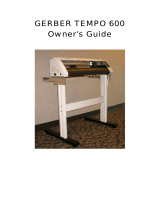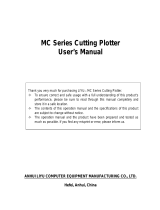
ix
WARNING
Do not disassemble or remodel the machine Handling of the cable
• Never disassemble or remodel the main unit of
the plotter and the vacuum unit. Disassembling/
remodeling any of them will result in electric
shocks or breakdown of the machine.
• Take care not to damage, break or work on the
power cable or communication cable. If a heavy
matter is placed on the power cable, heated or
drawn, the power cable can break to cause fire
or electric shocks.
Do not use the machine in damp places Handling of tools
• Avoid damp environments when putting the
machine into service. Do not splash water onto
the machine.
High-humidity or water will give rise to fire,
electric shocks or breakdown of the machine.
• Store cutter holders or blades in a place that is
out of the reach of children. Never place cutter
holders or blades in the tray on the operation
panel.
Abnormal event occurs Power supply and voltage
• If the machine is used under an abnormal
condition where the machine produces smoke
or unpleasant smell, fire or electric shocks can
result. Be sure to turn off the power switch
immediately and detach the plug from the
receptacle. Check first to be sure that the
machine no longer produces smoke, and
contact a distributor in your district or MIMAKI
office for repair. Never repair your machine by
yourself since it is very dangerous for you to do
so.
• This machine contains parts applied high
voltage.Carrying out electrical work by those
unauthorized for that work is prohibited.
• To prevent electrical shock, be sure to set OFF
the main power circuit breaker and disconnect
the power plug before carrying out
maintenance.For some units, capacitors may
take one minute for discharging; therefore, start
maintenance work three minutes after setting
OFF the main power circuit breaker and
disconnecting the power plug.
• Be sure to carry out grounding work to prevent
electrical shock.
• Use this machine under the power specifications
given.Be sure to connect the power cable plug
to a convenient outlet grounded, or fire or
electric shock might occur or it may cause
electrical shock.
• The main power circuit breaker should be set
ON only by personnel with sufficient knowledge
about operations of this machine.
Leave maintenance to a serviceman
• Leave maintenance works to a service engineer
whenever the machine has broken. Never
conduct maintenance works by yourself since
the works are always accompanied by possible
risks of electric shocks, etc.
Handling of the power cable
• Use a power cable attached to this machine.
• Take care not to damage, break or work on the
power cable.If a heavy matter is placed on the
power cable, heated or drawn, the power cable
can break to cause fire or electric shocks.B
Preventive measure against dust Grounding connection
• When handling any dust-producing substance
that will jeopardize the health of personnel, wear
a mask or the like to prevent dust.
• For this machine, grounding connection is
needed for prevention of an electric shock.
• Be sure to carry out grounding work.
Handling if grease
• If you get grease in your eyes, immediately flush with water for at least 15 minutes. Get medical attention.
• If grease settles on the skin or clothes, after wipe well, wash thoroughly with soap and water.
• If you inhale a lot of vapor and feel bad, move to a fresh air location and cover with a blanket to keep warm. Lie
quietly and receive medical attention.
• If anyone drinks grease by mistake, without induce vomiting, immediately consult a physician.
• Use powder, carbon dioxide, dry sand for an initial fire. Block out the air and oxygen using a foam fire
extinguisher for large-scale fire. Evacuate the people other than the person concerned to a safe place.
• Water injection in some cases is dangerous to expand the fire. Please do not use water to extinguish fire.
• Fire-fighters to wear protective machine. Work on fire extinguishing from the windward.





















